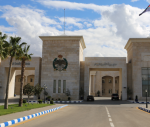You are here
Russia-proofing Europe
Dec 22,2022 - Last updated at Dec 22,2022
BERLIN — Ukraine will enter 2023 with wind in its sails. Against all odds, it repelled Russia’s initial attempt to take Kyiv, then recaptured extensive territory around Kharkiv and Kherson, and inflicted heavy losses on the invading forces. Speaking just after Politico named him the most powerful person in Europe, Ukrainian President Volodymyr Zelensky sounded an optimistic note for the winter, predicting that Ukrainians would be enjoying “peacetime” by next year.
Yet, as former Polish foreign minister Radek Sikorski has pointed out, it is hard to imagine a compromise that would allow for peace. If Russian President Vladimir Putin wants Ukraine to remain “non-aligned”, he will have to withdraw from all Ukrainian territory, effectively admitting defeat. But that would be a non-starter for him. Similarly, Zelensky is unlikely to consider conceding any Ukrainian territory unless Ukraine is also offered NATO membership. With these scenarios remaining unlikely, there is every reason to anticipate a protracted conflict.
With the prospect of a Russian military victory receding, Putin has been focusing on breaking the unity of the Western coalition that is supporting and supplying Ukraine. He is thus engaged in an “omni-conflict” that extends beyond the battlefield to include a multipronged offensive against the European Union.
For example, Russian terrorist tactics in Ukraine, including recent persistent attacks on civilian infrastructure such as power plants, are obviously intended to make life in Ukraine increasingly unbearable and generate another wave of refugees leaving for EU countries. Already, 30 per cent of Ukrainians are unemployed and Zelensky has asked refugees not to return this winter — an ominous sign.
The 14 million Ukrainians who have been displaced this year represent the largest number of refugees in Europe since the end of World War II, and the 8 million who have fled to the EU have already made the 2015 “refugee crisis” look like a warm-up act. Europeans’ generosity toward Ukrainian refugees has been heartening. But will it last?
The number of refugees in countries like Poland is so high — 8 per cent of the country’s residents were born outside of Polish territory — that some commentators now refer to it as a “binational country”. This transformation from a country of emigration to one of immigration will have profound consequences. Poland has already spent more than twice as much on hosting refugees than it has on providing military, financial and humanitarian aid to Ukraine. Nor is it alone. Germany, for its part, has now taken in more than 1 million Ukrainians.
In addition to weaponising migration, Putin will also continue to use energy supplies to weaken Western resolve, and food and fertiliser supplies to gain political leverage internationally. A recent analysis by The Economist shows that the price hikes provoked by Putin’s energy war could cause more than 100,000 excess deaths across Europe this winter, possibly exceeding total battlefield deaths so far.
Moreover, inflation, a direct result of Putin’s energy war in Europe, is likely to contribute to political instability around the world by further straining economies that were already weighed down by low growth, labour shortages, and the effects of ongoing trade disputes.
To deepen the effects of his energy war, Putin will continue to use sabotage and cyberattacks to degrade critical infrastructure such as pipelines, undersea cables, railroads, and communications networks. He also will step up his efforts to compete for influence and distract Western policymakers in fraught regions such as the Western Balkans, the Middle East and Africa.
The goal of all these ploys is more political than economic. Putin believes that his best — and perhaps only — path to victory lies in fragmenting the West. Through social-media disinformation and other subterfuge, the Kremlin is using all the tools at its disposal to interfere in European politics and pry open transatlantic rifts.
Transatlantic unity has been, and will remain, critical to Ukraine’s survival and European security more broadly. But it will come under increasing strain. In the United States, political forces on both the right and left are complaining about their country’s disproportionately large financial commitment to European and Ukrainian security. Moreover, there is deep disagreement about what should follow — the endgame — from Ukraine’s battlefield successes.
To confront the Kremlin’s multipronged assault, the EU must not only maintain its own unity; it also must step up its support for Ukraine to demonstrate that Europe is not a free-rider, and it must start formulating a shared long-term Russia policy. That will not be easy, given the low trust between member states on the issue.
At a minimum, Western European countries will have to abandon the dream of building a European security architecture that includes Russia. At this point, a stable European order can be achieved only in opposition to Putin, rather than in partnership with him. At the same time, frontline countries such as Poland will need to accept that even a European security order oriented against Russia will have to maintain diplomatic channels for talks on some issues.
Escalation and diplomacy both have important roles to play in sustaining public support for aid to Ukraine and sanctions against Russia, especially in those countries that feel less directly threatened by the Kremlin. The EU needs a comprehensive policy package — addressing everything from energy and migration to critical infrastructure and domestic politics — to defend itself against Putin’s omni-conflict. Europeans came together in new ways to confront the COVID-19 crisis. Now, they must do so again to develop herd immunity against Russian aggression, pressure, and skullduggery.
Mark Leonard, director of the European Council on Foreign Relations, is the author of “The Age of Unpeace: How Connectivity Causes Conflict” (Bantam Press, 2021). Copyright: Project Syndicate, 2022. www.project-syndicate.org














